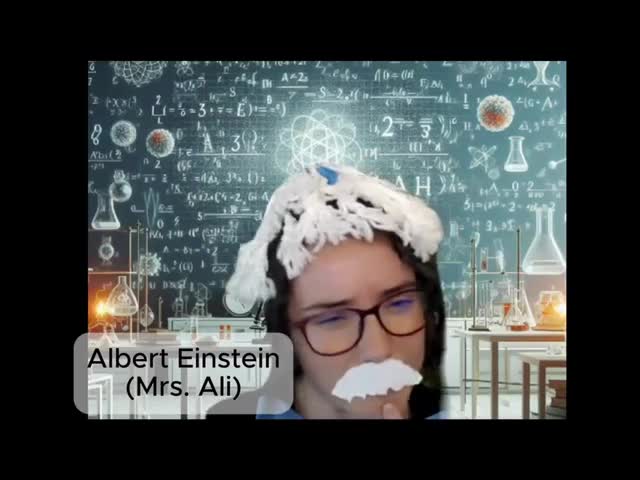First Month Free — use code BTS40. Offer valid for 80 credits plan.Learn More
20
($10 value)

Science in Action: Master Scientific Practices in 8 Weeks
New class
Ages 11-16
Self-Paced Class
8 pre-recorded lessons
8 weeks of teacher support
Choose your start date
1 year of access to the content
Enroll Now, Start Anytime
Go at your own pace
Your learner can start learning when they want and progress at the speed that works best for them.Start when you want.
Learn at your own pace
Access course material for a full year.
Get hands-on support from teacher.
Overview

Self-Paced Class
Asynchronous learning — no live meetings
8 pre-recorded lessons

8 weeks
of teacher support
1 year access
to the content
Mastery Evaluation
There are interactive elements and activities throughout the course that are embedded in the lesson.
Certificate of Completion
1 after class completionClass Experience

US Grade 5 - 10

Beginner - Intermediate Level
🧪Join our self-paced course, "Science in Action: Understanding Scientific Practices," designed to ignite curiosity and foster a deep understanding of how scientists work. This engaging 8-lesson course is perfect for young learners who are eager to explore the scientific world and develop essential skills for future scientific endeavors. 🔬Each lesson focuses on one of the eight scientific practices outlined by the Next Generation Science Standards (NGSS). Through a blend of interactive activities, and real-world examples students will gain a comprehensive understanding of these core practices: 1️⃣. Asking Questions 2️⃣. Developing and Using Models 3️⃣. Planning and Carrying Out Investigations 4️⃣. Analyzing and Interpreting Data 5️⃣. Using Mathematics and Computational Thinking 6️⃣. Constructing Explanations and Designing Solutions 7️⃣. Engaging in Argument from Evidence 8️⃣. Obtaining, Evaluating, and Communicating Information 🥼By the end of the course, students will be equipped with the skills and confidence to think like scientists, conduct their own investigations, and communicate their findings effectively. Enroll now and join us on an exciting journey into the world of science!
Learning Goals

Students will learn to ask meaningful scientific questions, define problems, and design investigations to explore these questions.
Students will learn to construct and communicate scientific explanations and arguments based on evidence.Syllabus

Curriculum
Follows Teacher-Created Curriculum
Standards
Aligned with State-Specific Standards8 Lessons
over 8 WeeksLesson 1:
Asking Questions
How to ask meaningful scientific questions 1 assignment
Lesson 2:
Developing and Using Models
Creating and using physical, mathematical, and conceptual models. 1 assignment
Lesson 3:
Planning and Carrying Out Investigations
Steps to design and conduct scientific investigations. Lesson 4:
Analyzing and Interpreting Data
Techniques for collecting, organizing, and interpreting data. Other Details

External Resources
Learners will not need to use any apps or websites beyond the standard Outschool tools.
Offered by
Teacher expertise and credentials

11 teachers have teaching certificates
Alaska Teaching Certificate in Foreign Language
New York Teaching Certificate in English/Language Arts
Pennsylvania Teaching Certificate in English/Language Arts
Kentucky Teaching Certificate
Pennsylvania Teaching Certificate in English/Language Arts
California Teaching Certificate in Mathematics
Washington Teaching Certificate in Foreign Language
Washington Teaching Certificate in Social Studies/History
Washington Teaching Certificate in English/Language Arts
Missouri Teaching Certificate
Florida Teaching Certificate in English/Language Arts
Ohio Teaching Certificate in Elementary Education
Pennsylvania Teaching Certificate in Music/Theater/Arts
Tennessee Teaching Certificate in Science

3 teachers have a Graduate degree
Master’s Degree in Education from National University
Master’s Degree in Education from Liberty University
Master’s Degree in Education from Western Governors University

14 teachers have a Bachelor’s degree
Bachelor’s Degree from Purdue University
Bachelor’s Degree in Education from Philadelphia College of Bible
Bachelor’s Degree in Secondary Education from Southeastern University
Bachelor’s Degree in Education from Millersville University
Bachelor’s Degree in Mathematics from California State University, Fresno
Bachelor’s Degree in English from Florida State University
Bachelor’s Degree in Early Childhood Education from Missouri State University
Bachelor’s Degree in Music from Western Connecticut State University
Bachelor’s Degree in English from University of North Florida
Bachelor’s Degree in Political Science and Government from Patrick Henry College
Bachelor’s Degree in Art and Design from St. Vincent College
Bachelor’s Degree in Mathematics from Hillsdale College
Bachelor’s Degree in Biology/Biological Sciences from Middle Tennessee State University
Bachelor’s Degree in Mathematics from University of Northwestern - St. Paul
Mrs. Mortimore has a degree in Biology, a teaching certificate, and a master's in curriculum and instruction. She has taught middle school for over seven years. She has also taught life science, biology, and conservation biology at two different zoo education departments.Reviews
Are you planning to use state funding, such as an Education Savings Account (ESA), Micro-grant or scholarship to help pay for your learner’s education?

